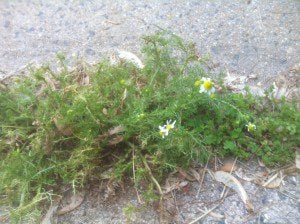 This picture is a renegade chamomile plant that came up through a crack in our driveway last year in Virginia. It came to mind as I was contemplating a recent lectionary gospel reading on Jesus’ parable of the weeds from Matthew 13:24-30. We discussed it last Sunday night at our Wesley Foundation meeting and Monday at an ecumenical Eucharist gathering I’ve been attending called the Worship Society of St. Polycarp. Weeds are an interesting phenomenon, because how we define what qualifies as a weed and what doesn’t is inherently a matter of perspective. So how does God define who the weeds are?
This picture is a renegade chamomile plant that came up through a crack in our driveway last year in Virginia. It came to mind as I was contemplating a recent lectionary gospel reading on Jesus’ parable of the weeds from Matthew 13:24-30. We discussed it last Sunday night at our Wesley Foundation meeting and Monday at an ecumenical Eucharist gathering I’ve been attending called the Worship Society of St. Polycarp. Weeds are an interesting phenomenon, because how we define what qualifies as a weed and what doesn’t is inherently a matter of perspective. So how does God define who the weeds are?
In the parable of the weeds, Jesus relates the story of a farmer who has planted a field of wheat when an enemy comes along and sows weeds in the same field. The farmer’s servants come to him and ask him what to do when they see the weeds mixed in with the wheat. The farmer says to leave the weeds alone until harvest time because trying to uproot them before then will kill the wheat plants also. So they wait until harvest time when they burn all the weeds and harvest the wheat.
Jesus explains to his disciples that the wheat represent the “children of the kingdom” while the weeds represent the “children of the evil one” (Matthew 13:38). He later clarifies further by using two Greek phrases to describe what will be cast out of the kingdom: skandala and poiountas ten anomian.
Skandala is a word for stumbling blocks or booby traps, so basically it encompasses anything or anyone that causes other people to stumble, pushes their buttons, or baits them into sinning.
Anomia means lawlessness, since nomos is law. Poiountas is derived from the same root word that is the basis for our word poet. So a poiountas ten anomian is not just someone who gets dragged into being lawless every now and then, but an architect of lawlessness, someone who drags others into lawlessness, the ringleader or key instigator behind derailing the harmony within a community.
As a former high school English teacher, this makes me think of the tactics I had to deploy in managing my classroom. On the one hand, I had students who were genuinely trying to learn but would lash out in anger whenever they got their buttons pushed (which other students were happy to do for their amusement as soon as they discovered the right buttons). So I had to factor in their stumbling blocks and personality conflicts in planning seating charts, group assignments, and classroom activities.
In addition, there were students who simply took pleasure in creating chaos. I could sometimes win these students over if I was playful enough for our class to be “crazy” in a constructive way. But mostly I just had to figure out how to shut them down really decisively early on because the rest of the class would follow their lead if they managed to hijack the conversation.
So it makes sense to me that God would cast out the stumbling blocks and architects of chaos from his kingdom. Of course, what’s significant about Jesus defining the “weeds” in this way is how it reveals God’s pragmatism. God doesn’t weed people out of the kingdom based on whether we pass a heavenly doctrine exam. He weeds out whatever and whoever would sabotage the harmony and peace of those who have accepted God’s mercy and have become a safe eternal community for each other. Bad doctrine matters insofar as it relates to our being skandala or poiountas ten anomian in God’s kingdom. It’s one thing to be wrong in some aspect of our understanding of God; it’s another thing to actively sabotage our community’s harmony and cause other people to stumble.
But now here’s a tricky thing. How do you tell the difference between a prophet who says things that nobody wants to hear and an architect of lawlessness? There’s a way you could presume from reading this parable that what Jesus wants are docile sheep who don’t rock the boat. But then we have to think about what a weed really is to Jesus. In this parable, a weed is defined in contrast to wheat on the basis of its lack of viable grain. It has no nutritional value.
If a weed is a plant that has no nutritional value, then American suburbia is filled with fields and fields of highly invasive, aesthetically comforting weeds (we call them “grass”). We trim these lovely weeds once a week to the same height. Some common species of weed that we use are Fescue, Bermuda, Zoysia, and St. Augustine. The reason that these weeds have been cultivated for use on our lawns is because they are able to quickly saturate a large plot of land with their roots and not allow any other species of plant to grow there so that our yard has a lovely uniform shade of green that our house guests can admire.
According to the terms of Jesus’ parable, if some of my chamomile plants invade my lawn and start growing there, they aren’t weeds that needs to be yanked out but a tiny fragile kingdom of fruitful plants in a sea of worthless weeds. The American lawn is an ecologically useless monoculture of wasted space. It’s a great metaphor for churches filled with the idols of the American dream which keep them from actually living in the kingdom of God. Churches that have developed a cultural consensus around idols like the nuclear family, patriotism, and the free market are “peaceful” in the same demonic way that an ecologically sterile American lawn is peaceful.
This is just to say that it doesn’t make anyone a weed to be a voice of dissent and dissatisfaction within the lawn of Fescue weeds that is American Christianity. There are certainly abrasive ways that we can go about expressing our dissent which create skandala and anomia for other people. Bottom line is God has put us all in the same garden together and we’re not allowed to yank anybody else out. But the same God who causes us to be reborn from above into new creation is capable of miraculously transforming Fescue into chamomile or whatever other fruitful plant he wants to grow.












